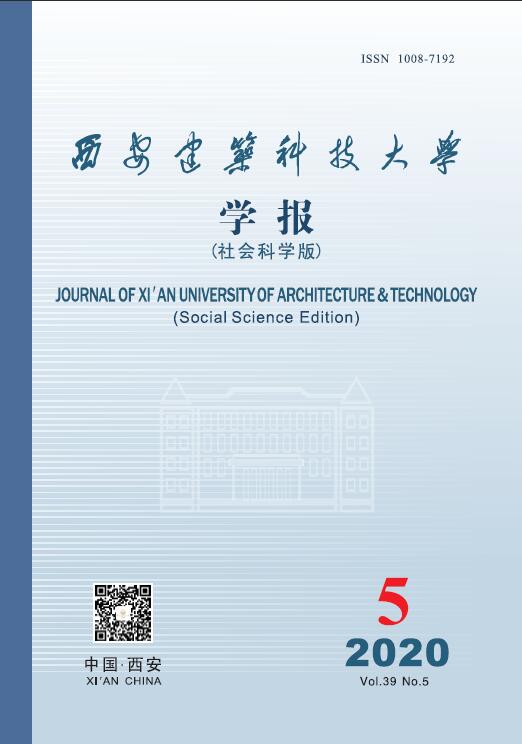(School of Marxism, Shaanxi Normal University, Xi'an 710000, China)
DOI: 10.15986/j.1008-7192.2020.05.001
备注
物质变换裂缝理论是马克思考察资本主义制度下城乡关系发展变化的重要理论成果,梳理该理论的历史逻辑,把握其产生、发展的全貌是建设生态文明的必然要求。物质变换裂缝是生产力与生产关系矛盾运动的必然结果,在资本主义社会产生之前已然存在,受生产力发展水平的限制表现出可修复的特质。资本主义生产方式推动物质变换裂缝走向高潮,资本逻辑反生态的本质决定了资本主义社会中物质变换裂缝具有不可弥补性。只有进入共产主义社会,生产力水平发展到人类对自然的支配不再以破坏与征服的形式呈现时,物质变换裂缝的不可弥补性才会消失,实现对自身的扬弃。
The theory of metabolic rift is an important theoretical achievement in Marx's investigation of the development and changes of urban-rural relations under the capitalist system. It is indispensable for the construction of ecological civilization to understand the historical logic of the theory and grasp the overall picture of its creation and development. Metabolic rift, an inevitable outcome of the contradictory movement between productive forces and production relations, exists before the capitalist society came into being, and is of repairable characteristics due to the restriction of the development level of productive forces. The capitalist mode of production drives metabolic rift to a climax. The anti-ecological nature of capital logic determines irreparable rift in capitalist society. Only when the society has enter into a communist society and the productive forces develops up to a level that human domination of nature no longer appears in the form of destruction and conquest, will the irreparability of metabolic rift fade away and realize the sublation of itself.
引言
马克思的物质变换裂缝理论从制度层面详尽论述了生态环境问题,为我们解读生态文明提供了一个全新的理论视野。随着生态问题愈发成为关注的焦点,这一理论在广度上和深度上均得到了相应发展,如美国左翼生态学家福斯特从生态和社会双重视角对马克思物质变换裂缝理论的重新诠释。但后来学者对该理论的深入研究更多立足于物质变换裂缝现象表现得最为典型的资本主义社会,揭示资本主义与生态环境之间矛盾的斗争性,对于呈现矛盾展开的全过程则稍显薄弱。在生态文明建设的重要性和紧迫性日益凸显的今天,需要将物质变换裂缝理论更加立体地呈现出来,动态地考察物质变换裂缝的出现、高潮以及在未来社会中的发展状况,透过物质变换裂缝的现象把握其背后存在的客观规律。
1 物质变换裂缝理论的前奏:前资本主义社会中可修复的物质变换裂缝
据福斯特考察,马克思的物质变换裂缝理论主要研究“人类与自然之间的‘新陈代谢':通过生产”[1]127,揭示资本主义生产方式与生态环境恶化的必然联系。在历史唯物主义的哲学基础之上,物质变换裂缝伴随人与自然关系的发展而出现,通过“自然异化”的形式已然存在于在前资本主义社会中,受生产力发展水平的限制表现出可修复的特质。
1.1 从“物质变换”到“物质变换裂缝”“物质变换”最初是表示“生命活动过程中有机体从外界摄取营养和从体内排出废料的过程”[2]1667的自然科学术语。马克思将其引入社会科学研究,赋予了“物质变换”三重含意,即自然界本身的物质变换、人与自然之间的物质变换和人类社会的物质变换[3]。其中,自然界的物质变换指无机物和有机物自然发生的新陈代谢过程; 人与自然间的物质变换指人类以劳动为中介调整和控制人与自然的关系,支配自然界的过程; 社会的物质变换则指商品交换的过程。人的实践存在方式和人的社会本质决定了物质变换的实质是人与自然之间的物质变换,在对自然界中的物质变换这一自然本身的必然性的认识和运用过程中,必然会导致社会的物质变换。因此,物质变换贯穿人类文明的发展历程,在不同历史时期具有不同的表现形式,是“人类生活得以实现的永恒的自然必然性”[4]58。通过对李比希“归还原理”的运用与发展,马克思提出了物质变换裂缝,“大土地所有制使农业人口减少到不断下降的最低程度……由此产生了各种条件,这些条件在社会的以及由生活的自然规律决定的物质变换的过程中造成了一个无法弥补的裂缝”[5]916。这里的“大土地所有制”即是存在于农业生产中的资本主义生产方式。需要注意的是,虽然物质变换裂缝直到马克思揭露资本主义生产方式与生态文明必然相背离的本质时才提出,但这并非意指物质变换裂缝只是资本主义社会特有的现象,而只是说“资本主义社会的‘裂缝'是最典型的,是无法弥补的‘裂缝'” [6]。通过对“自然异化”的解释,马克思进一步分析了物质变换裂缝出现的根本原因,揭露了资本主义社会产生以前,物质变换裂缝业已存在的客观事实。
1.2 物质变换裂缝在前资本主义社会业已存在物质变换裂缝,即是人与自然之间物质变换的过程中由于人类一味向自然索取而未返还给自然,或者人类对自然的返还超过了自然本身的承受能力而导致人与自然之间的物质循环出现断裂,造成生态环境失衡的现象。很显然,自然灾害、战争等偶然因素以及人类不合理的物质生产实践活动都能直接导致物质变换裂缝产生, 物质变换裂缝的历史应当早于资本主义的历史。“原发性的自然异化”是资本主义社会产生之前物质变换裂缝的存在形式。马克思所谓的“自然异化”是人与自然出现分离的必然结果,指“自然在人类的过度干预下出现的对人类的背离和惩罚现象” [7],在早期是由于受生产力水平所限,人类未能深刻认识自身与自然环境的辩证关系,盲目开展破坏自然的实践活动所导致的,是原发性的自然异化。在与恩格斯的书信往来中,马克思指出了人的实践活动对人与自然之间物质变换影响的二重性。“耕作的最初影响是有益的,但是,由于砍伐树木等等,最后会使土地荒芜……耕作如果自发地进行,而不是有意识地加以控制会导致土地荒芜”[8]471。人是能动性与受动性的统一,在受自然影响的同时也能影响自然。一方面,人类通过物质生产实践不断从自然界索取各种资源,使其转化为社会物质财富以实现自身的延续与发展。另一方面,人类利用自然资源满足自身所需的同时,又会将“生产排泄物”与“消费排泄物”返还给自然界。可见,人的实践活动既能创造生产生活资料、让人丰衣足食,但如若过度向自然界索取资源或过度干预自然,也会使良田变为荒原,形成物质变换裂缝。因此,虽然作为“原发性的自然异化”而存在的物质变换裂缝并不等同于资本主义社会中最为典型的“无法弥补的裂缝”,但其证实了物质变换裂缝在资本主义社会产生之前业已存在,并处于不断的运动之中。
1.3 前资本主义社会中物质变换裂缝的可修复性资本主义社会产生之前业已存在的物质变换裂缝与资本主义社会中的物质变换裂缝最为显著的区别在于其可修复性。首先,由于自然灾害、战争等因素的存在均具偶然性,并未涵盖经济社会发展的所有时间段,因而在此基础上形成的物质变换裂缝也是偶然的,具备被修复弥补的条件。当偶然因素消失,人与自然之间的物质变换在生态系统与人类劳动的双重调控下会逐渐恢复平衡,实现人与自然之间物质、能量的良性循环。其次,在生产力与生产关系矛盾的不断作用下,为了实现经济的发展与社会的进步,人类会从自身的实践活动中不断重新认识与自然的辩证关系,有意识地减少不合理的实践活动,人为地修补物质变换裂缝。很难想象“在一个生态危机频繁发生、生态环境遭受极大破坏的国家或区域如何实现经济发展,以及如何寻求社会进步”[9]。自然界的客观性以及对人的先在性与制约性必然要求修复物质变换裂缝,构建人与自然之间合理的物质变换关系。再次,受生产力发展水平的限制,资本主义社会产生以前人类不合理的实践活动对人与自然之间物质变换的影响尚达不到“无法弥补”的程度。诚然,随着以货币为媒介的商品交换活动的出现与增多,生产的目的由获得产品的使用价值转变为追求其交换价值,物质变换裂缝受到了商品经济发展的催化。但一方面,前资本主义社会中自然经济的主导地位限制了物质变换裂缝的广度; 另一方面,前资本主义社会中的简单商品经济控制了物质变换裂缝的深度,在此基础上,自然界本身具备的修复功能可以有效地将其弥补。 总之,资本主义社会产生之前已经存在的“可修复的物质变换裂缝”与资本逻辑驱使下“无法弥补的裂缝”是不同质的,马克思在论述后者时多次强调资本主义生产方式是物质变换裂缝发生质变的关键所在。资本像压榨雇佣劳动者一样压榨自然,“把地球上的资源视为资金一样是可以转变为利润来源的资产配置”[10]175 。随着资本逻辑的愈演愈烈,物质变换裂缝也愈发的无法弥补。
2 物质变换裂缝理论的高潮:资本主义社会中无法弥补的物质变换裂缝
资本主义生产方式推动物质变换裂缝发生了质变。在资本主义社会中,物质变换裂缝的存在形式已经由“原发性的自然异化”转变为“人为性的自然异化”,资本逻辑效用工具和逐利增殖的特质将金钱变为衡量自然界一切的标准,对交换价值和剩余价值的无限追求必然不计生态后果,从而使物质变换裂缝在资本主义社会中成为常态,并且显现出不可弥补的特性。
2.1 从“原发性的自然异化”到“人为性的自然异化”资本主义出现后,在追逐利润最大化的驱动之下,自然异化与人的劳动异化的联系愈发密切,人为性的自然异化逐渐代替原发性的自然异化成为物质变换裂缝的存在形式。资本是商品经济发展到极致的必然结果,在资本主义社会中,劳动产品本身具有的使用价值几乎完全被生产者遗忘,对交换价值和剩余价值的追逐成为商品生产的主要目的。正如马克思所言,“假如商品能说话,他们会说……作为物,我们没有使用价值……我们具有的是我们的价值。”[11]100资本不断膨胀的本性决定了生产资料的占有者必然会将交换价值完全置于使用价值之上,造成劳动者被自己创造的巨大生产力所异化。而异化劳动既是人的异化,也会造成自然的异化。随着劳动力成为商品,劳动者越是通过劳动去改造和占有自然界,就越是会受到自然界的严厉惩罚。在《资本论》中,马克思列举了大量事实论证资本主义生产方式在工农业领域的扩张使农村和城市、工业和农业之间出现了“无法弥补的裂缝”。“资本主义农业的任何进步,都不仅是掠夺劳动者的技巧的进步,而且是掠夺土地肥力持久源泉的进步……一个国家,越是以大工业作为自己发展的起点,这个破坏过程就越迅速。” [12]552-555资本主义社会中自然异化的产生已经不再是因为人类无法清楚地认识与自然环境的辩证关系,盲目地破坏自然,而是在资本逻辑的驱使下不得不牺牲自然来实现资本的增殖。换言之,人的异化导致了自然的异化,资本逻辑本身必然与生态文明发展的要求相违背,资本主义一方面汇聚着空前的历史动力,另一方面又对物质变换造成了空前巨大的破坏。
2.2 资本逻辑的反生态本质揭示资本主义社会中物质变换裂缝产生的直接原因是分工的进一步发展引发的城乡分离与对立仅仅只触及到了物质变换裂缝理论的表层,其深刻之处在于马克思从城乡关系的角度对资本主义生产方式展开的生态批判。在资本逻辑的驱动下,人与自然之间的物质变换必然会出现断裂,虽然资本的聚合力能够提高物质变换的效率,但资本逻辑本身具有反生态的本质。首先,在马克思看来,劳动者与生产资料相分离是资本主义产生的前提和基础,在劳动与资本对立统一的关系中得到发展的“不是活的和活动的人同他们与自然界进行物质变换的自然无机条件之间的统一……而是人类存在的这些无机条件同这种活动的存在之间的分离”[13]488。因此,资本主义私有制以强制力量切断了大多数劳动者与生产资料的直接联系,使“一些国家变成了纯粹的农业生产地,变成了为位于这种体系中心的工业发展提供原材料的纯粹原产地”[1]193,打破了人与自然之间物质变换的平衡。其次,资本逻辑效用工具的特质尊崇“对自然产生的最大影响就是将自然变为资本的实用工具”的理念。在这一理念的指导下,“人与自然皆以资本为依附并在资本审视下为自己存在的有用性进行辩护”[14],必然导致对自然无度地开发,促使人们不遗余力地去发掘一切自然资源的有用性而不顾自然环境的承受限度。最后,资本逻辑逐利增殖的特质建立在对自然界无限度地掠夺与向自然界无限度地排放的基础上,从而必然生成“无限的生产欲望与有限的自然承载力”之间的矛盾,不断为物质变换裂缝的产生提供动力。一言以蔽之,资本主义本身好比物质变换裂缝的天然培养基,不断为其出现创造条件,物质变换裂缝在资本主义社会中不再是偶然的存在,而是一种常态,其范围之广、程度之深达到无法弥补的地步。
2.3 资本主义社会中物质变换裂缝的不可弥补性资本主义社会是以大机器生产为特征的工业文明社会,马克思形象地将大机器生产比作“庞大的机械怪物”,认为它实现了生产效率和生产力成百上千倍的提高,但却是以成百上千倍地增加对自然资源的消耗和向自然界排放废料和残渣为代价。在资本主义工业文明“高消耗-高产出-高排放”的物质变换模式中,人类以各种形式消费掉的自然资源无法重新回归自然界,这必然导致对生态环境永久的损害,形成“无法弥补的裂缝”,主要表现在三个方面。一是自然资源枯竭。逐渐全球化的资本主义生产方式造成了对自然资源的过度索取,全世界现在每年的煤炭消费量约是1800年的500倍,石油消费量约是一个世纪前的380倍,天然气消费量在20世纪上升了约175倍…… [15]241。相比之下,人类对维护生态环境的投入则远远不足以弥补与自然之间断裂了的物质变换。二是环境污染严重。那些被消耗掉而无法重新进入物质变换过程的自然资源又发展为污染的源头,面对数量庞大的污染物,资本主义却往往束手无策,“例如,在伦敦,450万人的粪便,就没有什么好的处理方法,只好花很多钱用来污染泰晤士河”[16]115。高排放带来的大气污染、土壤污染和水污染仅仅在20世纪就夺去了数千万人的生命并造成了生产与再生产循环受阻,物质变换裂缝伴随资本主义的深入发展已经演变为“无法弥补的裂缝”。三是自然生产力受到严重摧残。自然生产力是自然界“能够创造自然生态财富和社会经济财富的能力”[17]270,是生产力系统不可或缺的构成,对于经济社会的发展具有基础和原生作用。但资本不断膨胀的运动让自然生产力备受摧残,资本主义每前进一步,自然环境的承载能力便要后退一步,自然生产力对经济社会发展的制约便更为明显。总之,物质变换裂缝在资本主义社会中是一种常态,其呈现出来的越来越严重的程度、越来越广阔的影响范围深刻地揭露了自身的不可弥补性。
3 物质变换裂缝理论的后续:走出物质变换裂缝困境的未来展望
资本主义的催化作用让物质变换裂缝变得不可弥补,但物质变换裂缝并不与资本主义社会的发展相始终,人与自然之间矛盾的长期性决定了物质变换裂缝也必将长期存在。只有当生产力发展到人类对自然的支配不再以破坏与征服的形式呈现时,物质变换裂缝的不可弥补性才会消失,实现对自身的扬弃。
3.1 垄断资本主义社会中物质变换裂缝的形式更为严峻资本主义社会的发展大致可分为自由竞争资本主义以及垄断资本主义两个阶段,马克思对物质变换裂缝现象的剖析主要是基于自由竞争资本主义的历史背景。从19世纪末开始,垄断资本主义对自由竞争资本主义的逐渐代替不仅未能缓和人与自然之间愈发紧张的物质变换,反而使物质变换裂缝的形式更为严峻。一方面,垄断资本主义阶段科学技术与生产更为广泛、高效地结合虽然逐渐淘汰了原先的劳动力密集型产业,但机械对劳动力的替代更加剧了对资源的消耗。以石油为例,根据大卫?哈维的描述,科学技术的介入使石油开采效率大幅提升,世界原油储备已经面临枯竭[18]21。另一方面,欧美发达资本主义国家对“美好生活环境”的追求使那些严重损害自然环境的产业逐渐转移到环境承载能力更低的发展中国家,物质变换裂缝遍布世界的各个角落。1984年发生在印度博帕尔市的毒气泄漏案便是典型例子。值得一提的是,当代欧美发达国家的生态环境指标明显优于世界其他发展中国家和地区,这一现象似乎证实了资本主义制度与生态环境问题的和解,但事实却并非如此。“北方国家的生态改良是建立在本国所产生的废物和污染物的全球转移以及全球范围内的资源能源掠夺的基础上的”[19],物质变换裂缝并未因为发达国家生态环境的改善而消失,只是更多转移到了第三世界国家。可见,垄断资本主义阶段资本主义的发展并未弥补物质变换裂缝,反而使劳动者和自然界受到了史无前例的剥削和掠夺。
3.2 社会主义社会中物质变换裂缝仍将存在物质变换裂缝在资本的作用下发展到极致,但正如物质变换裂缝的出现并非由资本主义决定一样,资本主义向社会主义的转变也不能使其消失。首先,按照历史唯物主义的基本观点,驱动物质变换裂缝不断变化发展的并非社会制度,而是生产力与生产关系的矛盾。社会主义社会中,生产力发展的束缚虽然通过生产方式的变革实现了一定程度的解除,但生产力水平仍和实现人与自然之间真正的和谐相去甚远。生产力与生产关系的矛盾外化出的人类征服与破坏自然的物质实践仍然存在,因此,仍旧不具备实现人与自然之间物质变换永恒良性循环的条件。其次,社会主义并不排斥市场的作用。虽然就生产关系而言,社会主义经济制度与资本主义经济制度存在质的区别,但二者都是商品经济的表现形式,市场要素同样在社会主义经济制度中发挥着重要作用。马克思指出,“无论哪一个社会形态,在它所能容纳的全部生产力发挥出来以前,是决不会灭亡的”[20]592。现实地看来,在两制并存的时代背景下,资本主义在经济、社会、生态等多方面仍长期占据着优势,资本仍然是社会主义社会发展生产力所必须利用的要素,由此造成的“无法弥补的裂缝”也必然长期存在。再次,社会主义社会作为“经过长久阵痛刚刚从资本主义社会产生出来的共产主义社会第一阶段”[21]364,各方面都不可避免地带有“旧社会”的痕迹。城市与乡村的对立、自然资源的过度消耗、工农业生产与其他人类活动带给环境的巨大污染……都会在社会主义社会中长期存在,换言之,社会实践的发展仍会不断对人与自然之间的物质变换提出挑战。
3.3 共产主义社会中物质变换裂缝对自身的扬弃马克思认为,只有进入共产主义社会,人类才能够“在最无愧于和最适合于他们的人类本性的条件下来进行这种物质变换”[5]926-927。物质变换裂缝在共产主义社会中将实现对自身的扬弃,成为偶然的、可修复的存在。首先,劳动作为调节和控制人与自然之间物质变换的中介在共产主义社会中将实现对异化的扬弃,所有劳动者将实现对由自己创造的巨大生产力的重新占有,实现向人的本质的复归。劳动从“谋生的手段”转而变为“真正的人的存在方式”,促使人和自然之间、人和人之间的矛盾得到真正解决。其次,生产力水平作为推动物质变换裂缝产生和发展的内因,在共产主义社会中将提升到一个前所未有的高度,不仅能满足全体社会成员对于物质、精神等各方面的需求,还能满足社会再生产循环的需要。经济社会的进步不再要求以破坏自然环境为代价,人对自然的支配将不再以征服与破坏的形式呈现。最后,共产主义社会中资本已经完成了自身的使命,资本追逐利润最大化对物质变换裂缝形成的催化作用也将不复存在,经济社会发展的目标已经转变为实现人的自由全面发展。而人与自然之间相互依赖与双向建构的辩证关系决定了人的自由全面发展必然要建立在人与自然和谐共生的基础之上,人类的一切实践活动都将以维护与自然之间良性的物质变换为前提。正如马克思所言,“共产主义,作为完成了的自然主义=人道主义,而作为完成了的人道主义=自然主义,它是人和自然之间、人和人之间的矛盾的真正解决”[22]297。但即使在共产主义社会中,人类依然是“自然存在物”,无法摆脱自然界独立存在。人与自然之间仍会不断产生矛盾冲突,物质变换裂缝不会完全消失,消失的只是其内在的不可弥补性,而这正是生产力进入新的发展阶段后物质变换裂缝扬弃自身的结果。
4 结 语
生态问题是经济社会发展过程中的“拦路虎”,在全球化的语境中,如何在实现发展的同时维护好生态环境是自然界对全世界所有国家共同提出的考验。物质变换裂缝是人与自然的关系不断发展必然产生的现象,2020年初肆虐全球的新型冠状病毒肺炎也是其表现形式之一。事实证明,就目前而言,改善人与自然之间的物质变换刻不容缓,尊重自然、敬畏自然,是我们改造利用自然时必然要抱有的态度。任何理论研究最终都是为了满足实践发展的需要,马克思的物质变换裂缝理论极具生态意义,梳理该理论的历史逻辑能让我们在理解物质变换裂缝时不仅仅停留在现象的表层,而是立体地把握其产生、发展的全过程和在未来社会中的发展状况,更好地利用理论对现实实践提供切实有效的指导。同时,只有把握了物质变换裂缝的全貌,才能认识到其不可弥补性历史地产生,也终将历史地消亡,从而更加坚定我们解决生态难题,建设生态文明,实现人与自然和谐共生的信心。
- [1]约翰?贝拉米?福斯特.马克思的生态学[M].刘仁胜,等译.北京:高等教育出版社,2006.
- [2]金炳华.哲学大辞典:修订本[M].上海:上海辞书出版社,2001.
- [3]郭剑仁.马克思的物质变换概念及其当代意义[J].武汉大学学报(哲学社会科学版),2004(2):200-205.
- [4]马克思,恩格斯.马克思恩格斯文集:第5卷[M].北京:人民出版社,2009.
- [5]马克思,恩格斯.马克思恩格斯全集:第25卷[M].北京:人民出版社,1974.
- [6]蒋彧.《资本论》物质变换裂缝理论的历史维度[J].南通大学学报(社会科学版),2017(3):26-30.
- [7]方世南.马克思的环境意识与当代发展观的转换[J].马克思主义研究,2002(3):47-56.
- [8]马克思,恩格斯.马克思恩格斯选集:第4卷[M].北京:人民出版社,2012.
- [9]宋建军,朱同丹.生态文明对传统发展理念的创新[J].南通大学学报(社会科学版),2008(4):107-110.
- [10]马克思,恩格斯.马克思恩格斯选集:第4卷[M].北京:人民出版社,1995.
- [11]马克思,恩格斯.马克思恩格斯全集:第23卷[M].北京:人民出版社,1972.
- [12]马克思.资本论:第1卷[M].北京:人民出版社,1975.
- [13]马克思,恩格斯.马克思恩格斯全集:第46卷[M].北京:人民出版社,1979.
- [14]夏承伯.资本逻辑、物质变换与马克思生产力论的生态意蕴[J].自然辩证法研究,2017(12):101-105.
- [15]克莱夫?庞廷.绿色世界史[M].王毅,译.北京:中国政法大学出版社,2015.
- [16]马克思,恩格斯.马克思恩格斯文集:第7卷[M].北京:人民出版社2009.
- [17]刘思华.生态马克思主义经济学原理[M].北京:人民出版社,2006.
- [18]大卫?哈维.新帝国主义[M].初立忠,等译.北京:社会科学文献出版社,2009.
- [19]张剑.生态帝国主义批判[J].马克思主义研究,2017(2):129-135.
- [20]马克思,恩格斯.马克思恩格斯文集:第2卷 [M].北京:人民出版社,2009.
- [21]马克思,恩格斯.马克思恩格斯选集:第3卷[M].北京:人民出版社,2012.
- [22]马克思,恩格斯.马克思恩格斯全集:第3卷[M].北京:人民出版社,2002.
